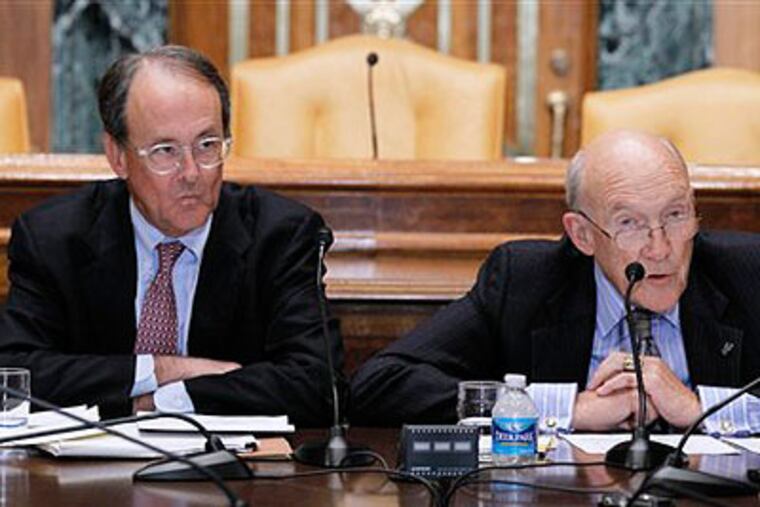Inquirer Editorial: An honest blueprint
The draft report of President Obama's deficit-reduction commission ends the myth that Congress can restore fiscal order just by cutting wasteful spending.

The draft report of President Obama's deficit-reduction commission ends the myth that Congress can restore fiscal order just by cutting wasteful spending.
The proposal makes clear that real sacrifice will be required across the board to put the federal budget back on a sustainable path. And the time for lawmakers to start that discussion is now.
Commission cochairmen Erskine Bowles, former chief of staff to President Bill Clinton, and Alan Simpson, a former Republican senator from Wyoming, propose deficit reductions of $3.8 trillion by 2020. Their plan would lower annual deficits from about $1.3 trillion this year to $400 billion in 2015.
You don't get there just by eliminating welfare fraud. Their plan would slash defense spending, freeze military pay, and cut one-third of bases overseas. The federal workforce would be trimmed 10 percent. Farm subsidies would be cut by $3 billion per year.
Social Security, Medicare, and Medicaid benefits would be reduced by $733 billion over 10 years. The retirement age would be raised gradually to 69 in 2075.
Discretionary spending, which includes everything from Pell grants to highway repairs to public housing, would be cut $1.4 trillion over 10 years.
Despite the depth of these spending cuts, the proposal also calls for tax increases. Most of them would be in the form of curbing tax breaks, such as reducing or eliminating the deduction for mortgage interest. That's not what the besieged housing market needs right now.
The commission recommends increasing the federal gasoline tax by 15 cents a gallon, starting in 2013. It would raise the income cap on Social Security taxes. (Currently, if you earn $1 million per year, you pay Social Security taxes only on the first $106,800 of income.) Fees at national parks would be raised.
Conservative lawmakers and antitax groups already are howling about the proposed tax increases. Their objections are out of proportion to the drafted suggestions.
If anything, the plan puts too much emphasis on spending cuts, which account for about 75 percent of the proposed deficit reductions.
Voters who carried the day in the midterm elections said they want the government to slash debt. In this preliminary plan, the commission has provided a useful blueprint of what the new reality would look like.
Obama, speaking in South Korea, said: "If people are, in fact, concerned about spending, debt, deficits, and the future of our country, then they're going to need to be armed with the information about the kinds of choices that are going to be involved."
Liberal lawmakers were too quick to criticize spending cuts, too. Perhaps the proposal tries to do too much too quickly, but the general framework for reducing deficits is sound.
The commission is preparing its final report for Dec. 1. It will need the agreement of 14 of its 18 members to send the report to Congress for possible action.
Congress won't be bound by any of the commission's eventual recommendations. But if lawmakers are concerned about restoring fiscal sanity, they'll use this plan as a guide for meaningful action.